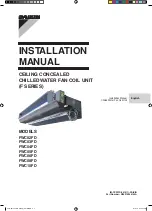
⚠
WARNING
PERSONAL SAFETY
•
Stay alert, watch what you are doing, and use common sense when operating the fan. Do not use
the fan while you are tired or under the influence of drugs, alcohol, or medication. A moment of
inattention while operating the tool may result in serious personal injury.
•
Dress properly. Do not wear loose clothing, dangling objects, or jewelry. Keep your hair, clothing
and gloves away from moving parts. Loose clothes, jewelry, or long hair can be caught in moving
parts. Air vents on the tool often cover moving parts and should be avoided.
•
Wear the proper personal protective equipment when necessary. Use ANSI Z87.1 compliant
safety goggles (not safety glasses) with side shields, or when needed, a face shield. Use a dust
mask in dusty work conditions. Also use non-skid safety shoes, hardhat, gloves, dust collection
systems, and hearing protection when appropriate. This applies to all persons in the work area.
•
Do not overreach. Keep proper footing and balance at all times.
•
Ensure the power switch is off prior to plugging in the tool.
⚠
WARNING
ELECTRICAL SAFETY
•
Grounded tools must be plugged into an outlet properly installed and grounded in accordance with
all codes and ordinances. Never remove the grounding prong or modify the plug in any way. Do
not use any adapter plugs. Check with a qualified electrician if you are in doubt as to whether the
outlet is properly grounded. If the fan should electrically malfunction or break down, grounding
provides a low resistance path to carry electricity away from the user.
•
Double insulated tools are equipped with a polarized plug (one blade is wider than the other). This
plug will fit in a polarized outlet only one way. If the plug does not fit fully in the outlet, reverse the
plug. If it still does not fit, contact a qualified electrician to install a polarized outlet. Do not change
the plug in any way. Double insulation eliminates the need for the three wire grounded power cord
and grounded power supply system.
•
Avoid body contact with grounded surfaces such as pipes, radiators, ranges, and refrigerators.
There is an increased risk of electric shock if your body is grounded.
•
Do not expose power tools to rain or wet conditions. Water entering a power tool will increase the
risk of electric shock.
•
Do not abuse the power cord. Never use the power cord to carry the tools or pull the plug from an
outlet. Keep the power cord away from heat, oil, sharp edges, or moving parts. Replace damaged
power cords immediately. Damaged power cords increase the risk of electric shock.
•
When operating a power tool outside, use an outdoor extension cords marked "W-A" or "W".
These extension cords are rated for outdoor use, and reduce the risk of electric shock.
⚠
CAUTION
FAN USE AND CARE
Page 5 of 12






























